Wednesday, Sept. 27 to Friday, Sept. 29, the board of visitors at the College of William and Mary convened during its quarterly meeting. Various committees primarily focused on the establishment of Key Performance Indicators, or KPI, to track performance.
While alumni groups and other members of the College community have shared their concerns with the College’s recent drop in the U.S. News and World Report’s rankings, the board did not discuss rankings.
Richard Bland College Committee
The board heard remarks from Richard Bland College of William and Mary President Debbie Sydow, RBC Student Assembly Vice President Kylie McCoy and members of the RBC administration.
Of note, the committee discussed a proposal to expand the pathway from RBC to the College, especially for in-state and low-income students.
Beginning in Spring 2024 and continuing for each spring semester, RBC will choose up to 15 first-year in-state students who are Pell Grant recipients that are committed to attending the College and designate these students as Promise Scholars with a conditional offer of admission to the College for their third and fourth years.
McCoy presented the student perspective to the BOV, most notably discussing the increase in RBC campus life activities.
“It’s been shocking how much student engagement we’re having compared to last year where students would always say, ‘Well there’s nothing to do on campus!’ It’s now, ‘There’s always something to do on campus,’” McCoy said.
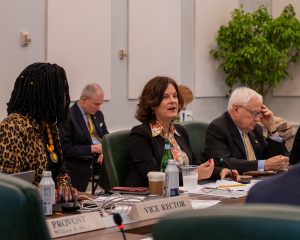
Committee on Academic Affairs
The board initiated the discussion by addressing faculty concerns. Of primary concern was the consideration of a program that would provide tuition breaks for faculty members’ children. This proposal stems from similar programs at other universities that documented higher retention rates for faculty.
The Academic Affairs committee’s meeting centered on KPIs, as the College has unveiled a strategic plan outlined by six KPIs. Three of those KPIs focus on student success: Applied Learning Opportunities, Post-Graduation Outcomes and Student Success. The remaining three KPIs are dedicated to faculty, including Faculty Research, Faculty Teaching and Faculty Research and Impact. Faculty Research seeks to increase the number of submissions for large-scale interdisciplinary grants and increase the number of research grants.
“One of the things that really impacts students experience is access to classes they want
access to,” Board member Kendrick F. Ashton, Jr. ’98 said. “One of the tension points that always existed here is the fight to be in classes. I think it would be helpful to understand how frustrated students may be with respect to getting access to the class they want access to.”
In an attempt to alleviate student frustrations, the College will implement a new registration initiative for the upcoming semester, according to Associate Provost and University Registrar Alana Davis. All students will enter the CourseLeaf software system during the same period and rank class options during a “shopping” period.
“You come out of that period with a cart,” Davis said. “Then behind the scenes, once that shopping period closes, this office and the system engage in a process where we then engage the priority groups and student time slots.”
Class priority will go from seniors to freshmen, and students will still be able to make adjustments to their schedule once they receive them.
During the end of the meeting, the board also discussed graduation rates for students receiving Pell Grants and first-generation college students.
Committee on Audit, Risk, and Compliance
The board heard reports from Chief Compliance Officer Pamela H. Mason, who provided the latest updates on compliance reports and investigations.
According to Mason, there is an increase in reports and investigations from the previous year. In 2022, there were nine investigations and 140 reports. In 2023, there have been 12 investigations and 149 reports.
The majority of cases reported to the Office of Compliance and Equity in 2023 falls under Title IX.
Don Butler, interim acting vice president for public safety and chief of police, and Police Department Detective Sarah Crowe gave reports on the College’s threat assessment process. Additionally, Butler detailed the College’s plan to cooperate with the state government and the latest numbers on the logging of criminal data.
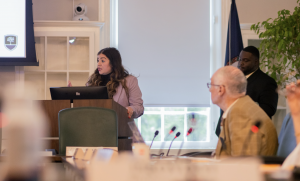
Committee on Administration, Buildings, and Grounds
The board heard reports from Sean Hughes, interim College associate vice president for business affairs. Hughes provided an update on the 10-to-100-year campus plan update commissioned in July 2023 by College President Katherine Rowe.
This comprehensive campus plan aims to lead the College to re-accreditation by the Southern Association of Colleges and Schools Commission on Colleges in 2025-2026. The plan is supported by three major areas — the learning spaces plan and the housing and dining plan, which both span 10 years, while the landscape plan spans 100 years.
The board will have oversight of the plan through the College’s Design Review Board chaired by board member Ardine Williams and the board’s committee on Administration, Buildings and Grounds. The plan will come before the board for approval in 2026.
Performing Arts Complex Tour
Teachers and board members toured the newly completed music building, as well as the remodeled Phi Beta Kappa Hall. These buildings are two major contributions to the College’s performing arts section, complete with dedicated conference venues, acoustic spaces and theater halls within each of the buildings dedicated to supporting performing arts classes.
“They were really intentional about acoustics and providing spaces where students could practice and learn, which I think is really awesome,” Sydney Thayer ’24, Student Assembly president and representative for the board of visitors to administration, buildings and grounds, said.
“They were really intentional about acoustics and providing spaces where students could practice and learn, which I think is really awesome,” Sydney Thayer ’24, Student Assembly president and representative for the board of visitors to administration, buildings and grounds, said.
Committee on Financial Affairs
The board acknowledged changes to the current state budget, finalized the 2024-2030 Six Year Plan and reviewed new potential budget requests.
Details regarding the Six Year Plan have been modified to align with state priorities. The proposal includes plans to increase tuition by 3% for FY2025, allocate the new revenue to salary increases, detail financial aid and Vision 2026 goals and detail improvements in access and affordability, career readiness and growth in the Computer and Data Science departments.
Committee on Institutional Advancement
The board heard reports from College Vice President for Strategy and Innovation Jeremy P. Martin Ph.D. ’12, MBA. ’17 on enrollment and admissions, including updates from the working groups on rankings.
Martin also presented a new plan for the College’s integrated marketing strategy, headed by three working groups on content, experience and media. He then laid out the latest data for the College’s admission statistics, with the College admitting and waitlisting approximately 33% and 20% of applicants, respectively.
Rowe established a working group to explore the College’s ranking options in July, and Martin gave an update on recent progress. He said the group has convened twice and will submit more progress to the committee in the future.
Martin also said the College will double the cohort of William and Mary Scholars to 100 students beginning in the Fall of 2024. According to the College’s website, this award is presented each year to a small group of academically distinguished students who have overcome unusual adversity and/or are members of underrepresented groups.
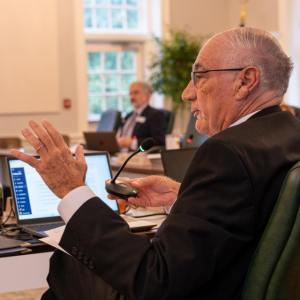
Martin then provided updates on the number of Pell Grant recipients, which has been steadily increasing in recent years.
Matthew T. Lambert ’99, vice president for University Advancement and CEO of the William and Mary Foundation, provided updates on the All-In alumni fundraising campaign for athletics. He explained that the College has raised $45,955,063 out of this year’s total fundraising goal of $55 million.
New Member Pinning and Board Pledge – Rebecca Piester
The evening of Thursday, Sept. 28, Rowe and the board gathered in the Blue Room of the Wren Building to take a pledge and receive new member pins.
In his remarks to the board, Director of Wren Operations and Events Charles Fulcher ’99 provided the members with a brief history of the building.
“The board of visitors did continue to meet here until the late 20th century,” Fulcher said. “Today, the space is still actively used by students. Student organizations, organizations and societies will hold ceremonies of great solemnity and work this year.”
According to Rector Charles E. Poston J.D. ’74, the board still utilizes the room for the College presidential selection process.
Following the ceremony, members rose to take the Board Pledge. Board members, Rowe, Sydow, Thayer and Taylor Locks, Associate Director of the Professionals and Professional Faculty Assembly, also signed the board book.
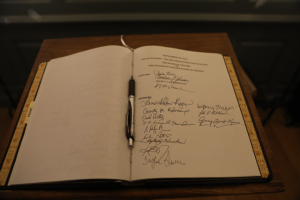
Full Board Meeting
The board met on Friday, Sept. 29 for its full board meeting.
The board heard summaries of committee meetings from committee chairs and approved 23 resolutions.
Rowe and Sydow provided introductory remarks. Sydow thanked board members who visited RBC and for their work related to the institution. Sydow also said she and Rowe signed a Promise Scholars Agreement for in-state Pell-eligible students in July. The program, which provides support for students such as offering College courses at RBC, aims to ease the transition for students transferring into the College.
RBC committee chair John P. Rathbone P ’02, ’05 reaffirmed the committee’s commitment to establish a new governance model for RBC. Last year, RBC and the board attempted to form an independent board, but the Virginia House of Delegates blocked the process.
Rowe, in her report, detailed the College’s commitment to Pell-eligible students.
“This fall, our incoming Pell-eligible first year and new transfer students increased by 14%,” Rowe said. “Great work to the admissions team and to Student Affairs and to all of our students here who welcome them and let them know they belong. Over the past decade, our in-state Pell grant recipients have grown by more than 23%.”
She also reaffirmed her commitment to free speech.
“I think the polarization of our country, the mistrust, the attacks on freedom of expression, that’s a third really significant issue,” Rowe said. “I’m grateful to Faculty Assembly for continuing to think on that with me. We’re proud of our green Free Speech rating from [the Foundation for Individual Rights and Expression]. We’re one of three only institutions in Virginia that have that rating, and we are laser-focused on ensuring that we hold open the space of debate and civil disagreement as widely as possible at this institution.”
Last February, the board approved a resolution emphasizing its support for freedom of expression on campus.
The board then approved a resolution charging Rowe with overseeing a rewrite of the Faculty handbook to improve accessibility. Rowe said she has been discussing the matter with K. Scott Swan, faculty assembly president and David Peebles Professor of Business, and David Armstrong, Chancellor Professor of Physics and faculty representative to the board of visitors.
During his committee report, Ashton discussed director of athletics Brian Mann’s concern over the possibility of student-athletes earning the status of College employees.
“He shared what most concerned him is the possibility, either by legislation or litigation, that student athletes will ultimately be treated as employees, which may fundamentally change the nature of our relationship with student-athletes, perhaps in ways that are incompatible with our mission,” Ashton said.
“He shared what most concerned him is the possibility, either by legislation or litigation, that student athletes will ultimately be treated as employees, which may fundamentally change the nature of our relationship with student-athletes, perhaps in ways that are incompatible with our mission,” Ashton said.
Ashton said the committee plans to engage in further conversations with Mann and College Vice President for Student Affairs Virginia Ambler ’88, Ph.D. ’06 in advancing KPIs going forward.
Thayer, in her final report to the board, said students are excited for the new performing arts complex. She also detailed Student Assembly’s efforts to increase student engagement with voting and promote healthy habits.
“Student Assembly is working really hard to make sure that students are engaged with Williamsburg and practicing their right to vote,” Thayer said. “We think it’s very important to be William and Mary students but also actively engaged in the broader community, and so we’re working on voter registration efforts and helping students get to know the people who are going to be on their ballot.”
Locks then presented her report on behalf of the Professionals and Professional Faculty Assembly and Staff Assembly. The Professionals and Professional Faculty Assembly represents the 806 professionals and professional faculty at the College and the Virginia Institute of Marine Science, and the Staff Assembly is all operational and classified employees and non-student hourly wage employees. While she said staff members are excited about new changes at the College, she raised concerns regarding the administration’s approach to management.
“Concerns have been raised to Assembly leadership about William & Mary’s ability to attract and retain talent in upper management and senior leadership roles,” Locks wrote in her report. “These concerns seem to be escalated by the departure of several key university leaders, followed by the departure of their successors in interim roles. We understand the importance of hiring the best candidates, but operating with multiple, extended vacancies in critical positions is not sustainable.”
Locks elaborated more on the matter.
“Hiring challenges are not exclusive to leadership positions,” Locks said. “Many employees have expressed frustration due to processes and practices that they believe hamper recruitment and retainment of talented employees. Some concerns expressed include inadequate market research, inconsistent salaries across similar positions, lack of recruitment tools and departure of high-performing employees due to an inability to compete with counteroffers.”
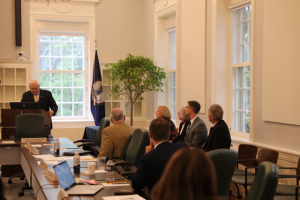
Additionally, Locks noted that the assemblies she oversees are seeing a rise in concerns over the health of employees across campus, particularly regarding the recent rise of COVID-19 cases and other diseases, such as the flu. Locks said the assemblies aim to keep a close eye on the issue and update the board regularly.
Turning to the topic of campus safety, Armstrong said some faculty members have expressed concerns following the shooting at the University of North Carolina at Chapel Hill in August.
“While W and M has an active Emergency Management Team, and provides online training on how to respond to such an event, it may be that there is more that we can do to prevent a similar tragedy, and to be ready to deal with it should it occur,” Armstrong said.
Another concern Armstrong listed was the impact of learning loss following the pandemic.
“This learning loss could adversely affect on-time graduation rates, and create an equity gap for some students wanting to major in STEM fields,” Armstrong wrote. “We may need to look into ways that we can ameliorate these effects in our curriculum and by using our academic support systems.”
All resolutions were approved unanimously, except “Resolution 19: W&M 2024-2030 Six Year Plan,” on which Board Member Brian P. Woolfolk, J.D. ’96 voted against. He expressed his opposition to funding the James Monroe’s Highland, which was a plantation owned by former U.S. President and alumnus James Monroe and has been owned by the College since 1974.
“I’m a Black guy in Virginia, and I can’t support money for a visitor’s center at a plantation,” Woolfolk said. “The people there do great work and history is important, but at the end of the day, we’re still glorifying an enslaver, and I’m not comfortable with that.”
The board’s next meeting will take place from Nov. 16 to Nov. 17.

